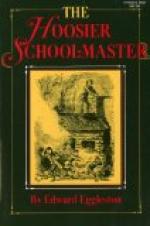There was a long, derisive laugh. The wit was indifferent, but by one stroke Ralph had carried the whole school to his side. By the significant glances of the boys, Hartsook detected the perpetrator of the joke, and with the hard and dogged look in his eyes, with just such a look as Bull would give a puppy, but with the utmost suavity in his voice, he said:
“William Means, will you be so good as to put this dog out of doors?”
FOOTNOTES:
[Footnote 2: Aout is not the common form of out, as it is in certain rustic New England regions. The vowel is here drawn in this way for imperative emphasis, and it occurs as a consequence of drawling speech.]
[Footnote 3: “’Nough said” is more than enough said for the French translator, who takes it apparently for a sort of barbarous negative and renders it, “I don’t like to speak to him.” I need hardly explain to any American reader that enough said implies the ending of all discussion by the acceptance of the proposition or challenge.]
[Footnote 4: Durn’t, daren’t, dasent, dursent, and don’t dast are forms of this variable negative heard in the folk-speech of various parts of the country. The tenses of this verb seem to have got hopelessly mixed long ago, even in literary use, and the speech of the people reflects the historic confusion.]
[Footnote 5: To take a dare is an expression used in senses diametrically opposed. Its common sense is that of the text. The man who refuses to accept a challenge is said to take a dare, and there is some implication of cowardice in the imputation. On the other hand, one who accepts a challenge is said also to take the dare.]
[Footnote 6: Most bad English was once good English. Ketch was used by writers of the sixteenth and seventeenth centuries for catch. A New Hampshire magistrate in the seventeenth century spells it caitch, and probably pronounced it in that way. Ketch, a boat, was sometimes spelled catch by the first American colonists, and the far-fetched derivation of the word from the Turkish may be one of the fancies of etymologists.]
[Footnote 7: The derivation of raccoon from the French raton, to which Mr. Skeat gives currency, still holds its place in some of our standard dictionaries. If American lexicographers would only read the literature of American settlement they would know that Mr. Skeat’s citation of a translation of Buffon is nearly two centuries too late. As early as 1612 Captain John Smith gives aroughcune as the aboriginal Virginia word, and more than one New England writer used rackoon a few years later.]




